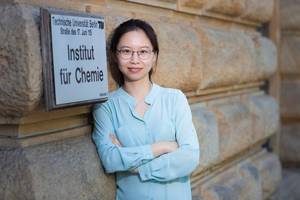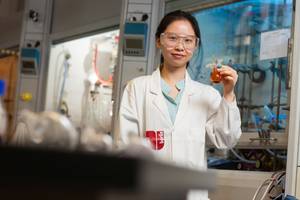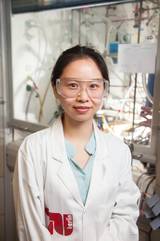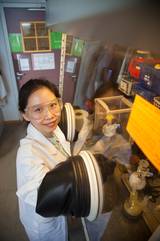It made me feel unique to synthesize something which didn’t exist before
13 June 2017
Interview with current Berlin International Graduate School of Natural Sciences and Engineering (BIG-NSE) fellow Min Ha Kim on the occasion of the 10th Anniversary of BIG-NSE
 |
Min Ha Kim studied chemistry at Seoul National University, in South Korea, where she obtained her bachelor’s and master’s degrees. There she was particularly interested in synthesizing precious metal complexes.
She met Dr. Lonjaret, the Managing Director of the BIG-NSE while participating in a fair for PhD applicants organized by the German Academic Exchange Service (DAAD), and got to know the graduate school and the Cluster of Excellence, UniCat. Min Ha Kim successfully applied for a BIG-NSE fellowship, and joined UniCat Chair Professor Matthias Driess’ group.
UniCat asked her about her research, her motivation to join the BIG-NSE, and her opinion on the initial phase, the interdisciplinary approach, and the international network at BIG-NSE.
What about BIG-NSE attracted you?
As I was interested in studying in Germany, I was collecting some information on programs. While doing so, I participated in a fair for PhD applicants organized by DAAD. There I learned about the BIG-NSE and discovered it had this great opportunity to study chemistry in a very specialized “research cluster UniCat”. UniCat has many research groups which study diverse concepts of catalysts. I was quickly able to find a topic and research group that met my interests, and I decided to apply for it! The program looked especially interesting due to its very well-organized structure and supportive system for students.
What did you do before joining the BIG-NSE?
I studied chemistry at Seoul National University and was especially interested in synthesizing noble metal complexes, because it made me feel unique to synthesize something which didn’t exist before. I would like to cite one professor’s analogy between synthetic chemistry and building with legos: with the chemical elements in hand, you can build whatever you want to.
So while completing my bachelor’s degree, I joined an organometallic group for an internship, in which I first learned experimental techniques. There I synthesized N-heterocyclic carbenes and their gold complexes. I really enjoyed it and there was something about the chemical laboratory that I liked. Therefore, I continued on to my Master’s to learn more and wrote my thesis about ruthenium olefin metathesis catalysts.
What is your current research topic?
The research areas in UniCat are largely divided into two parts: chemical and biological catalysis. I am participating in the chemical catalysis area, working in Professor Driess' group at the TU Berlin. Our group studies coordination chemistry, catalysis, and material chemistry.
My topic is to utilize silylene ligands to synthesize noble metal catalysts. For now, I have been working on iron and aluminum complexes. Silylenes are chemical compounds containing a divalent silicon atom without charge. They are heavier analogues of carbenes, which have been used as an excellent ligand in homogeneous catalysis. Based on their electronic properties, silylene-based ligands are very promising for more efficient catalysts.
Can you tell us about the influence of the interdisciplinary approach on your work?
I am doing a kind of pure synthetic inorganic chemistry and we do collaborate with other chemistry research groups. Since I make inorganic – or let’s say, metal - catalysts, I would like to learn more from organic chemists about the potentially applicable reactions with the complexes I’ve made. To understand the complex mechanism of catalytic reactions, we ask computation chemists for theoretical calculations.
What is your assessment of the initial phase at BIG-NSE?
In the three-month initial phase we heard lectures by professors participating in UniCat. It helped us to understand the concept of UniCat. We could also learn about up-to-date research results, and what needs to be studied in the coming days. We also had some soft skill courses, including for example, an English course for scientists, time-management workshops, and an intercultural communication seminar. All of them were very helpful in preparing for a smooth research phase. In addition, foreign students participated in a German language class, which I really liked because it is difficult to have time for this once you start your research project.
The initial phase ended with a workshop in which each student presented his or her research proposal. Regarding all aspects, I would like to say that the initial phase was really meaningful for the students, before they started their actual research in the laboratory.
What were the advantages for you?
I think I am quite lucky to be part of BIG-NSE. Without such a program I might have started my PhD study without so much support. BIG-NSE helped me to integrate with many other students, and also gave me an opportunity to learn diverse aspects of catalysts. In particular, the lab visiting program during the initial phase was impressive because we could actually see what is going on in other kinds of laboratories, helping us to widen our understanding of catalysis in general.
What do you think about the international network of BIG-NSE/UniCat?
BIG-NSE/Unicat is very international, not just in terms of its student body and professors, but the school also promotes our networking and social events. We organized the international evening, where we can talk about other cultures and enjoy great food together in a relaxed atmosphere. Academically, our international network is quite well developed. Every semester UniCat organizes colloquia, where they invite excellent scholars from all over the world to give a seminar about their research. There, we learn about state-of-the-art research results and develop an opportunity for future collaboration.



